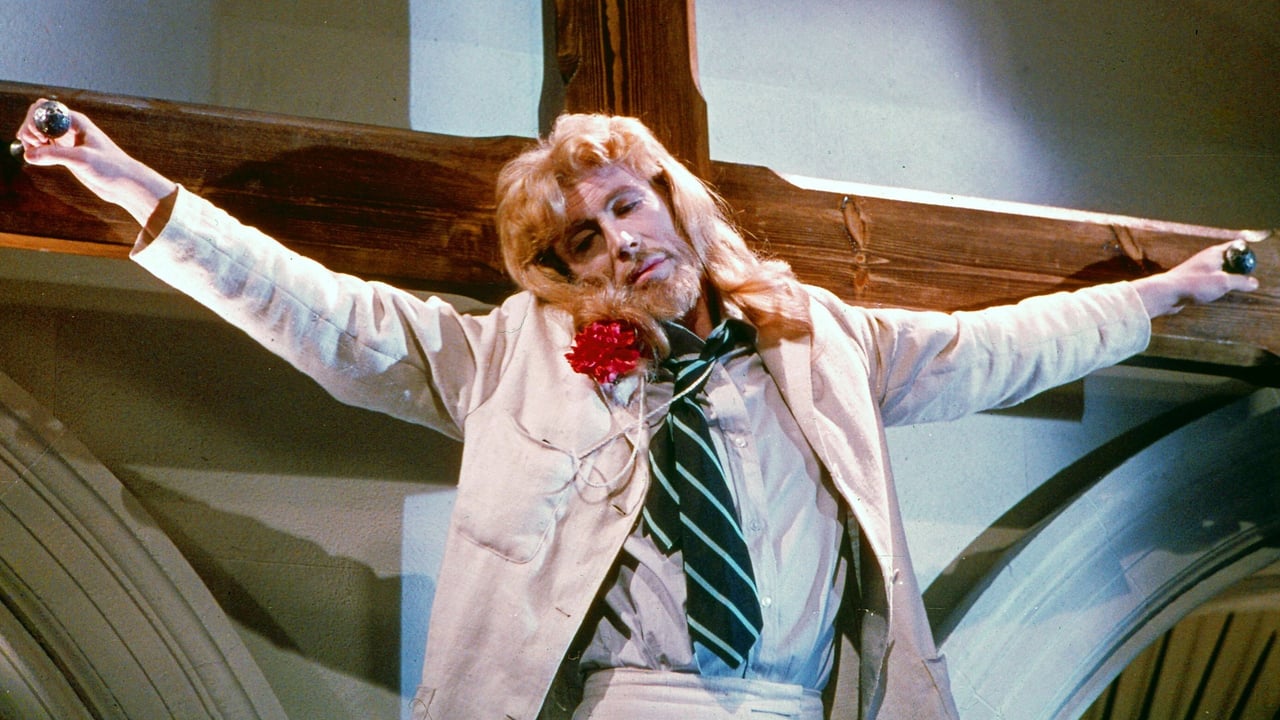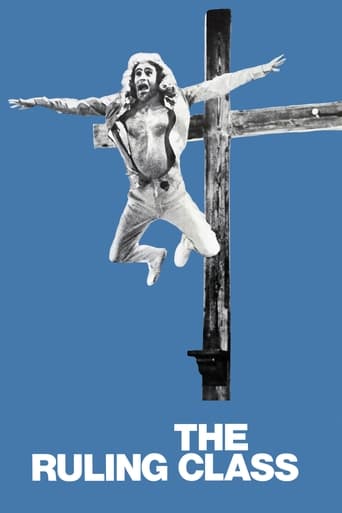

Peter Medak's "The Ruling Class" stars Peter O'Toole as Jack Gurney, a nobleman who inherits a relative's wealth and estate. As Gurney's family are emblematic of Britain's ruling class – aristocratic, powerful, duplicitous and uncaring – Gurney undergoes a mental breakdown. Refusing to be complicit with the "reality" of the social class he was born into, a "reality" that he deems inhumane, Gurney starts believing himself to be Jesus Christ.As the adage goes, 'the ruling ideas of every epoch are the ideas of the ruling class'. Refusing to abide by this anymore, Gurney begins to embody values, principles and beliefs that are antithetical to those of his family (love, peace, equality etc). They find his "virtues" disgusting, he finds their world intolerable. The film climaxes with Gurney's family members restoring "sanity" to Gurney, at which point he believes himself to be Jack the Ripper. As a murderous madman, Gurney is embraced by the British establishment. Like most political, British, post-war theatre, the film thus aligns conservative, post-war capitalism to a goofy ruling class who specialise in crushing souls. Final act? Gurney murderously cutting ties with loved ones whilst communists (a butler who reads Marx, Lenin and Mao) are scapegoated by the rich. Final scene? Gurney applauded by his peers and standing at the heart of a British parliament populated with zombies. The symbolism speaks for itself.Like "Heaven's Above!" (1963), a similar British film, "The Ruling Class" finds two ideologies vying for control. On one hand we have what might be called "Christian" or "liberal" values, and on the other, more traditional, conservative values. In the film, these strands are incompatible. In the real world, beneath our civilised Jesus tends to lie The Ripper, and vice versa. More importantly, the latter can't get away with its crimes unless it perceives itself as anointed, sanctified and righteous.Based on a play by Peter Barnes, "The Ruling Class" is an overlong and at times dull film. There are nevertheless many interesting passages peppered about, some very good surreal moments, some wonderfully blunt/gross satire (evocative of Bunuel) and another good performance by O'Toole, whose role seems to critique the kings and rulers he played earlier in his career ("Becket", "The Lion in Winter"). It's a shame that Medak's film isn't more focused, because he has very interesting material to work with.7.5/10 – Worth one viewing. See "They Might Be Giants" and "A Thousand Clowns".
... View MoreA very dark and farcical comedy recounts a lunatic's rising in the British ruling class, it is an adaptation of Peter Barnes' stage play. Jack Gurney (O'Toole) is a paranoid schizophrenic man lived in asylum for 8 years, who thinks he is Jesus Christ, the funny thing is that he is also the sole heir of his accidentally self-asphyxiated father, the 13th Earl of Gurney, and to inherit the peerage, his return to his family villa does hinder his vile uncle Sir Charles' (Mervyn) plan to take possession of the family estates. Jack, who advocates to bring love and charity to the world, affectionately claims "believe in me in loving goodness" while anything unsavory is "put into his galvanized pressure cooker and disappears", but in they eyes of Dr. Herder (Bryant), Jack's psychiatrist, he is a nut-case with a delusion of grandeur. While he deploys all the experimental methods to cure him, Sir Charles has his own plan to get the possession of the property, he marries off his mistress Grace (Seymour), who actually was going to marry Jack's father, to Jack and hopes they produce an heir, then he can fittingly put his nephew into an institution, so he can acquire the power. Wantonly, things don't go that way, though Jack successfully marries Grace, the ceremony is presided by bishop Lampton (Sim), whose predicament to officiate Jesus' matrimony is side-splitting to watch, and Grace delivers a son shortly. But Dr. Herder's persistence, partly incensed by Charles' wife Lady Claire (Browne), who sides with Jack to get redress for Charles' infidelity, finally works, a face-to-face encounter with another mad man McKyle (Green) who also believes himself to be Christ in a thunderous night miraculously cures Jack (with a little help from an imaginative gorilla in tuxedo), or not? Anyway, everyone is convinced Jack is back to normal, only his sporadic stuttering which Jack exerts himself to hide suggests otherwise.The film runs about 154 minutes, an unusual length for a play-turned-film, in the third act, Jack fancies himself as the notorious Jack the Ripper, therefore the film tones down its lighthearted and musical leitmotif and starkly mutates into a murderous drama, until the stirring end of a zombie parliament and Grace's shrilling scream. The tonal shift is deviant (particularly when characters precipitately start singing and dancing without any cinematic cues) but it does thrust a sharp-edged dagger into the putrid aristocracy rank and the top tier decision-makers, but Barnes' pungent script doesn't leave anyone else unscathed, the loyal but verbally transgressed butler Tucker (Lowe) is passed off as a whipping boy for the murder; the gold-digger Grace cannot win her husband's heart no matter how tantalizing her striptease is; more jarringly, Dr. Herder, a foreigner deeply believes in his scientific methodology, fails to grasp the situation and is driven mad by the appalling fact. There is dark humor galore, but so is the unbridled disdain towards the mundane sanity. This is one of Peter O'Toole's 8 Oscar-nominated performances, and it is not just a worthy one, in my book, he should win, it is the kind of physically taxing and mentally exhausting prototype which can daunt any Shakespearian thespian, but Mr. O'Toole is wholeheartedly invested in the before-and-after changeover, ranges from extremes like explosively maniac to perturbingly merciless, not counting his solemn imitation of Christ, constantly puts audience in a weird position doesn't know whether to laugh or cry. This ensemble piece is consummated with a handful impressive supporting performances from Lowe, Sim, Browne, Seymour and Bryant, each adds their own flair to this ludicrous and outlandish tall tale. As for the still-working director Peter Medak, browsing through his later career, his third feature might be his best,The most indelible line, also featured on the movie's poster, is when asked how he had decided that he was God, Jack nonchalantly replies, "I found that whenever I prayed to God, I was talking to myself." And Dr. Herder should have realized that no sanity can be induced from that axiomatic logic.
... View MoreThis movie is sometimes brilliant, sometimes silly, sometimes surreal, sometimes tragic, sometimes wickedly satirical, and always schizophrenic (which is the whole point). It's also the only film in which Jesus Christ does the Varsity Drag. Peter O'Toole plays the paranoid schizophrenic heir to an English earldom, and as his relatives try to either cure him or commit him, what we think is being played for laughs slowly becomes something far darker.O'Toole's performance is brilliant, bringing out this man's almost unbearable pain as he tries to hold his mind together by escaping into whatever fantasy world he can manage. Unfortunately, escaping into a world where he is God and everyone loves each other does not work for society, so his family has to snap him out of that so he can become acceptable. At its core, the film is about what kind of insanity (and what kind of god) is acceptable in upper-class British society, and it makes its points on that score very well. But unfortunately, it's far too long; there are so many supporting characters with their own subplots that it gets bogged down in many places. But if you can last through the slow parts, you'll be rewarded with some unforgettable scenes before the end. Seven stars.
... View MoreThe Ruling Class (1972)This is a peculiar, long, hilarious and tedious movie, depending on your taste and probably your age. Parts of it have always made me perk up and laugh, but it works the same theme (of the exhaustion of the old British ways) to death.Peter O'Toole lets it all hang out here, for sure, as Jesus, and as a crazed new British Lord (including a famous final section where he gives a speech to the House of Lords, which is filled with cobwebbed skeletons). It's not really supposed to be haunting or scary, but it's slightly gruesome comedy is pointed, for sure. And funny. If you don't laugh or at least give a crooked smile to the battle between two men who think they are god--O'Toole as the Jesus God and Nigel Green as an Old Testament God, and the Electric Messiah (both). It's crazy and crazed and yet what else do you expect?Someone said it perfectly when they called it a "comedy with tragic relief." O'Toole won an Oscar for his efforts (and he played his part for free). The American version of the movie has 6 minutes missing, though probably the wrong 6 minutes. A good editing might remove an hour and have a faster and more punchy movie. Still, it is what it is, and there's nothing quite like it.
... View More